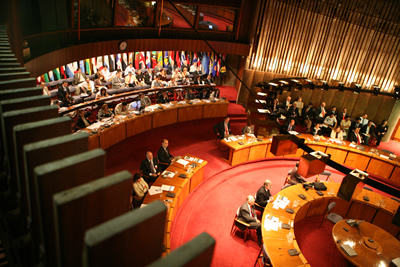Policies to Foster Structural Change, Growth and Equality to be Explored during the next ECLAC Session

|
| Photo: ECLAC |
Two years after having published the book Time for equality: closing gaps, opening trails –in which a development agenda focusing on equality within Latin American and Caribbean countries was proposed– ECLAC continues reflecting on this topic in a new publication that will be launched during the Organization's Thirty-fourth Session.
The new ECLAC document focuses on policies necessary to promote structural change and economic growth in the region by creating more jobs and enhancing equality.
This roadmap elaborates on the link between long-term development and short-term cycles in economies open to trade and capital inflows. Likewise, it includes policy proposals in which productive development, macroeconomic stability and inequality reduction are addressed in an articulate manner.
The Session is the most important biennial meeting of this United Nations institution, which will take place for the first time in San Salvador, El Salvador, from 27-31 August. The previous meeting was held in Brasilia, the capital city of Brazil, in 2010.
ECLAC and the Government of El Salvador signed an agreement in April stating both parties' commitment to the organization of this international meeting, where the participation of approximately 400 delegates coming from more than 50 member and associate States is expected – including chancellors or ministers of Economy and Commerce of all Latin American and Caribbean countries.
At the meeting, the countries will have the opportunity to debate on regional economic, social and environmental development; analyze the activities guided by ECLAC during the past two years; and define priorities in the working agenda for the next two years. Also in the context of this event, the South-South Cooperation Committee will hold its session.
Some of the main topics to be discussed at the meeting are macroeconomics for development, small economies and the results or impacts of the economic crisis.
In addition to the new position paper, ECLAC is
preparing further reports for informing the delegates' debate, which
will address the situation of middle-income countries, the regional
financial architecture, anti-crisis measures and mid-term
development in El Salvador.
| At the meeting, the countries will have the opportunity to debate on the region's economic, social and environmental development and define priorities in the ECLAC's working agenda for the next two years. | |
|
|
|
| The new ECLAC position paper focuses on policies necessary to promote structural change and economic growth in the region by creating more jobs and enhancing equality. | |